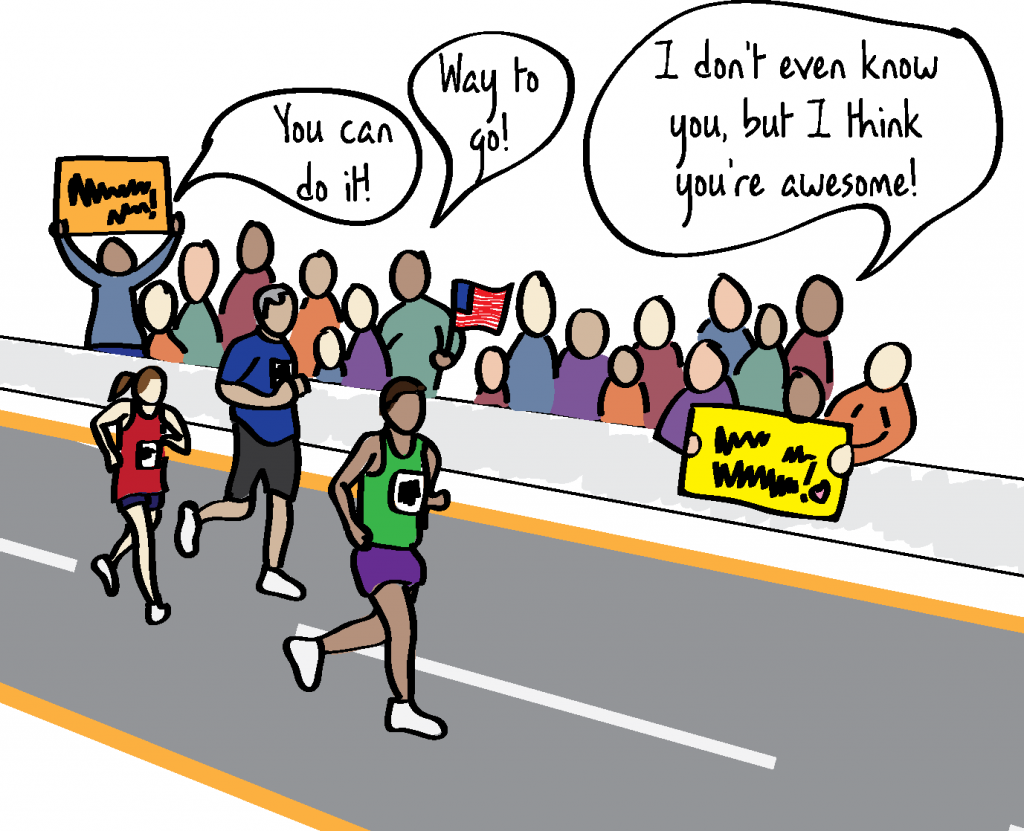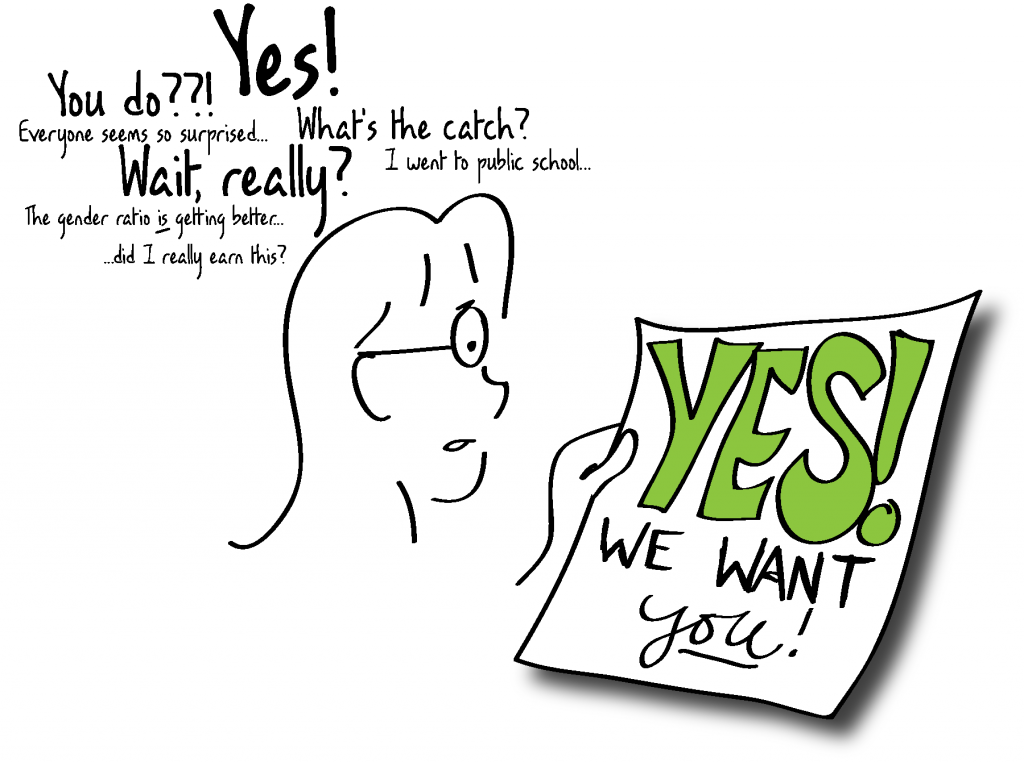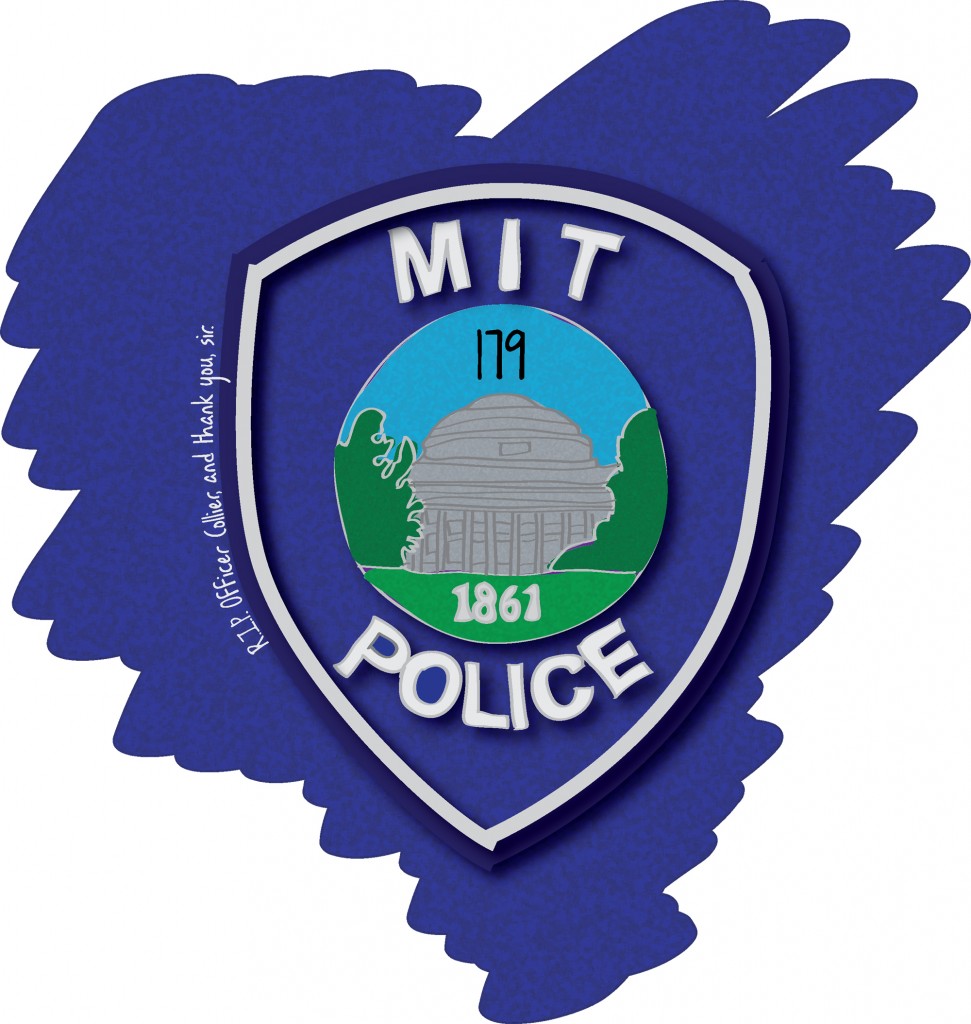A couple of years ago I stood near the bottom of Meteor Crater in Arizona and stared at a fist-sized chunk of rusting iron embedded in the crater wall, a remnant of the ~50-meter-diameter nickel-iron meteorite that slammed into the Earth about 50,000 years ago. When an impact crater is formed, a lot of things happen at very high temperatures and pressures – some of which we still don’t really understand – and one thing that’s often left behind is an “intimate mixture” of blown-off meteoritic material from the impactor and beaten up native rock from the impact site.1 In the case of Meteor Crater, formed in the same sedimentary sequence as the Grand Canyon, you could hardly ask for two more different rock types to be smashed up and slammed together by cosmic chance.
That is the closest analogy I’ve found so far to express how I feel about my trip to Boston last week. My thoughts are an intimate mixture of two completely different events that I would normally never group together but now can’t separate: the Boston Marathon bombings, followed by the manhunt for the Tsarnaev brothers, and the 2013 Women in Aerospace Symposium at MIT. Unlikely bedfellows, no?
I found out about the Boston Marathon bombings at about 12:30pm last Monday – about 40 minutes after they happened – and I spent the rest of the day trying, and sometimes failing, to hold it together enough to get through everything I needed to do. I was stuck (still am) on a problem in my research and also preparing slides for the talk I would give on Thursday at a symposium for female grad students working in aerospace or space science. I never find it easy to simultaneously work on fixing a problem that’s buried in the details AND step back to look at the bigger picture. Random fits of tears didn’t help.

My memory of the Boston Marathon, from a few years ago.
(also, proof that I should probably practice drawing people =/)
It’s hard to explain why I felt so personally affected. No one I know had been injured in the attack. In the four years that I lived there, I only ever went to watch the Boston Marathon once, but once was enough to leave a lasting impression. I found it hard to hold it together on that day too, not because it was sad in any way but because it was so completely full of positive emotion. Here were these people who had decided to do something hard – ridiculously hard – just for the sake of doing it, and this crowd full of strangers had come out to cheer them on and to share their seemingly unlimited reserve of enthusiasm and support. It was a huge concentration of shared passion and goodwill – it was amazing.
Hearing what happened last Monday, that someone could be there, of all places, and want to hurt people, knocked the wind out of me a little bit. My idealism took a hit, and I think I’m still mourning that.
And then, of course, I went to Cambridge for a few days.
Honestly, I wasn’t worried about going. I figured it was actually a pretty safe place to be, given all the attention and security, and anyway we’d be at MIT, far away from the marathon finish line in Boston. Everyone knows now how that turned out.
But before all the terribleness happened, I had a really great experience getting to know a group of other grad students in science and engineering, meeting a few (female!) role models in academia, and talking about the kinds of issues and decisions we’re faced with as women and as early-career professionals. I don’t want to dwell too much on the single-genderedness of the symposium – men face problems in academia too – but it was really refreshing to be in a room full of female engineers and scientists for once. It almost never happens.
Lately, I’ve been hearing all kinds of negative things about academia (both science and humanities), but there was none of that here – a completely different attitude. I don’t know what it means for me exactly, but it did shake up my outlook a bit, and the discussions made me realize that many of the challenges in grad school that seem so intense and so specific to me (to name a few: maintaining confidence that I’m on the right path in solving a problem; the irrational but almost-unsquashable fear that someone will “find out” that I’m not actually as good as they thought I was; difficulty balancing work stuff and life stuff) are really universal issues.
At one point in a panel discussion, one of the professors mentioned that undergraduate women at MIT sometimes say that they think they were only admitted to fill a quota. Hearing that was like being punched in the gut. I was one of those girls; I remember thinking that exact thing. Is it really so common?

Yeah, I really felt like this…how dumb is that? I wish I could shake younger-me to snap her out of it, but it seems like many other young women might feel the same way.
I must have gotten over it at some point because I had forgotten feeling that way, but now it seems like that insecurity is not so different from the kinds of insecurities I face today, and maybe I shouldn’t be so hard on myself for all the things I’m not perfect at. How terrible is it that an amazing thing like getting into the college of your dreams could be the seed of so much self-doubt?
It gave me a lot to think about. Between all of that and my presentation (which went pretty well I think) and meeting astronaut Bonnie Dunbar and having a really nice dinner, it was an awesome day. I went to bed feeling really, really good.
And woke up to a nightmare.
Sean Collier, an officer of the MIT Police, was shot in his cruiser two blocks from our hotel, at an intersection my husband had walked through just a couple hours earlier. We’d heard the sirens but hadn’t thought anything of it, and by the time I found out what had happened, my family was already clamoring to talk to us and I’d gotten half a dozen text messages from worried friends. MIT was closed, the city locked down. The second day of the symposium was canceled. No one knew for sure what was going on, or if there were more accomplices, or if it was safe to go outside. It was Scary.
 And there wasn’t much to do but wait. It didn’t take long for someone to suggest that we continue the symposium in some smaller way – many of us were in the same hotel, after all. So we piled into a hotel room, collected presentation slides in a public Dropbox folder, and set up a Google hangout for others to join us online. Prof. Dava Newman showed up with a projector not long after we started and soon, aside from the fact that people sitting on the left-side bed had to be careful of jiggling the projector and aside from the almost-certainly-just-garbage-truck sounds from the street making us jump every so often, the second day of the symposium was really humming along. It was not at all normal, but it felt good to try.
And there wasn’t much to do but wait. It didn’t take long for someone to suggest that we continue the symposium in some smaller way – many of us were in the same hotel, after all. So we piled into a hotel room, collected presentation slides in a public Dropbox folder, and set up a Google hangout for others to join us online. Prof. Dava Newman showed up with a projector not long after we started and soon, aside from the fact that people sitting on the left-side bed had to be careful of jiggling the projector and aside from the almost-certainly-just-garbage-truck sounds from the street making us jump every so often, the second day of the symposium was really humming along. It was not at all normal, but it felt good to try.
All in all, this was a very odd trip to Boston and I’m still processing it. What I’ve taken away – from both events – is that now is the time to figure out what’s important and I should be focusing on that more than anything. Carpe diem, and all that. It’s easy to get caught up in silly things, or to be discouraged by bumps in the road, but the right thing for me is out there, and it really is within my grasp. I don’t know what’s going to happen tomorrow, so I might as well choose to be happy today.

Left: Lana Osusky and Dava Newman prepping for Lana’s talk
Right: other makeshift-symposium attendees, from left to right:
Back row: me, Stephanie Coronel, Elizabeth Jens
Front Row: Jess Chang, Julia Cole, Shoshe Cole (no relation), Laura Stiles
- To get a little bit of history in: Whether or not the iron impactor was destroyed in the collision that formed Meteor Crater was a very important question in the early 20th century. G. K. Gilbert thought it should be buried beneath the crater, and when he couldn’t find it he concluded that it wasn’t an impact crater at all, but the result of a subterranean steam explosion. D. M Barringer thought it should be there too, and purchased the land intending to mine the iron and make a fortune. In reality, almost all of the impactor was vaporized in the collision, and Barringer passed away in 1924, nearly bankrupt.


I’m so sorry Meg. Your story is very touching. The world is a profoundly terrible and beautiful place. I don’t think anyone who is truly in it can be fully happy or at peace. There is no drug for that, there is nothing you can take for it. But I’d very much rather be fully in it than not, because of the so so many beautiful bits that you can recognize for what they are.
I’ll forgo the syrupy encouragement for hard-headed science: your continued feelings of insecurity (which washes over me like a fever even after 20 years at JPL once in a while) are inconsistent with the data. You are the Midas of Caltech, outside of work at least. How many plays have you turned to gold? How many other Ph.D students formed an entire theater group that has produced like eight shows? How many lives have those endeavors touched? How many other Ph.D students filled every seat in Beckman, plus 500 more, with a “side project”? How many others can claim a comic book and a blog like this one? Ach, you’ll solve your currently-leaden work problem.
This came to mind for getting out of ruts – probably very overly simplistic – John Cleese on Creativity. It’s kind of long, sorry.
Thanks, Dave =) Theater projects and people have always been a huge comfort to me, here at Caltech and at MIT, and I’m so grateful for that. There’s nothing like starting and finishing a creative endeavor within a few weeks – and really making something new by the end of it – to balance out the long-term chain of problems to solve that is research.
Hello Meg,
Really wonderful post. I wrote some reflections on my blog after the Newtown Shooting. I think it’s always when things like these happen that we stop for a second and truly reflect on what we value in our lives.
Academia is tough. But I believe that if you truly are passionate about what you do, and it sounds like you do, then there is absolutely not reason why you should ever doubt yourself. The only reason for the negativity in academia now is because many went in with the wrong reasons (“because there are jobs in academia” shouldn’t be the reason to go into it). What we need more of, are people like you, who care about research and about inspiring others.
Btw, your people drawing skill is fine!! I am still at stick men level… :D
Thanks, Theresa. Yes, it’s good to have an opportunity every once in a while to take a step back. And I hope nobody goes into academia because they think that’s where the job market is wide open!
Amazing that you talk about our shared concerns about “whether we really deserve to be here”. In 1980 I decided NOT to apply to Vet School at the University of Georgia because I really did see women being admitted for the wrong reasons. In the late 70’s early 80’s there was a quota system that required numerous university programs to have the make-up of a class with the same proportion (gender) of applications. 45% female applicants… 45% female/55% male class ratio. I didn’t apply because I was too worried about what people would think “did she deserve to get in or did she get in because she’s female?” I chose to go to graduate school in the field of Plant Breeding Cytogenetics instead. Finished up with a PhD in Crop Production/Physiology and Carbohydrate Chemistry. Did I settle? I don’t think so. All of our lives, we make choices and I believe we’re most successful when we, as they say, “buy in” to our decisions. I could look back and imagine… I’d rather look forward and know that I’m the best I can be, doing what I love… and to heck with what anyone else thinks about my choices! I just found your website, and I’m fascinated. Thanks for being such a wonderful voice in this thing we call the scientific community. Now I want to go take some science history classes!